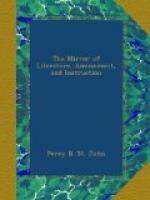This species of bat is abundant at Tongatabu, and most of the Polynesian Islands. At the sacred burial place at Maofanga (island of Tongatabu) they were pendant in great numbers from a lofty Casuarina tree, which grew in the enclosure. One being shot, at Tongatabu, it was given to a native, at his request, who took it home to eat. From the number of skulls found in the huts at the island of Erromanga (New Hebrides group), and the ribs being also worn in clusters, as ornaments, in the ears, they very probably form an article of food among the natives. Capt. S.P. Henry related to me, that when at Aiva (one of the Fidji group) he fired at some of these bats, which he had observed hanging from the trees, on which they all flew up, making a loud screaming noise, at the same time discharging their foeces on the assailants.—Mr. G.B.’s MS. Journal, August, 1829.
* * * * *
THE SELECTOR AND LITERARY NOTICES OF WORKS.
ANNUAL BIOGRAPHY AND OBITUARY OF 1831.
Within this volume, it may almost be said, “keeps death his antic court.” It comprises biographies of celebrated persons, who have died within the year, as well as a General Biographical List of others lower in the roll of fame. The biographies are 31 in number: among them are memoirs of Henry Mackenzie, Elliston, Jackson the artist, Abernethy, Mrs. Siddons, Rev. Robert Hall, Thomas Hope, Carrington, the poet of Dartmoor, Northcote the artist, and the Earl of Norbury, and William Roscoe. These names alone would furnish a volume of the most interesting character, and they are aided by others of almost equal note. The memoirs are from various sources, in part original; but, as we have cause to know the difficulty of procuring biographical particulars of persons recently deceased, from their surviving relatives, we are not surprised at the paucity of such details in the present volume. Nevertheless some of the papers are stamped with this original value; as the memoirs of Mrs. Siddons and Mr. Thomas Hope. Our extracts are of the anecdotic turn.
Abernethy.
An anecdote illustrative of the sound integrity, as well as of the humour, of Mr. Abernethy’s character, may here be introduced. On his receiving the appointment of Professor of Anatomy and Surgery to the Royal College of Surgeons, a professional friend observed to him that they should now have something new.—“What do you mean?” asked Mr. Abernethy. “Why,” said the other, “of course you will brush up the lectures which you have been so long delivering at St. Bartholomew’s Hospital, and let us have them in an improved form.”—“Do you take me for a fool or a knave?” rejoined Mr. Abernethy. “I have always given the students at the Hospital that to which they are entitled—the best produce of my mind. If I could have made my lectures to them better, I would certainly have made them so. I will give the College of Surgeons




